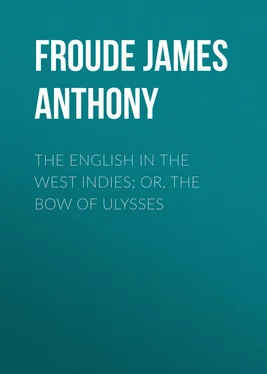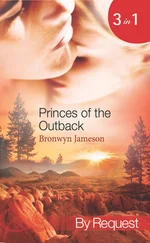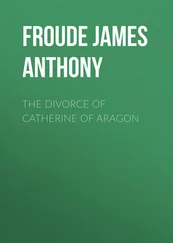James Froude - The English in the West Indies; Or, The Bow of Ulysses
Здесь есть возможность читать онлайн «James Froude - The English in the West Indies; Or, The Bow of Ulysses» — ознакомительный отрывок электронной книги совершенно бесплатно, а после прочтения отрывка купить полную версию. В некоторых случаях можно слушать аудио, скачать через торрент в формате fb2 и присутствует краткое содержание. Жанр: foreign_antique, foreign_prose, Путешествия и география, на английском языке. Описание произведения, (предисловие) а так же отзывы посетителей доступны на портале библиотеки ЛибКат.
- Название:The English in the West Indies; Or, The Bow of Ulysses
- Автор:
- Жанр:
- Год:неизвестен
- ISBN:нет данных
- Рейтинг книги:5 / 5. Голосов: 1
-
Избранное:Добавить в избранное
- Отзывы:
-
Ваша оценка:
- 100
- 1
- 2
- 3
- 4
- 5
The English in the West Indies; Or, The Bow of Ulysses: краткое содержание, описание и аннотация
Предлагаем к чтению аннотацию, описание, краткое содержание или предисловие (зависит от того, что написал сам автор книги «The English in the West Indies; Or, The Bow of Ulysses»). Если вы не нашли необходимую информацию о книге — напишите в комментариях, мы постараемся отыскать её.
The English in the West Indies; Or, The Bow of Ulysses — читать онлайн ознакомительный отрывок
Ниже представлен текст книги, разбитый по страницам. Система сохранения места последней прочитанной страницы, позволяет с удобством читать онлайн бесплатно книгу «The English in the West Indies; Or, The Bow of Ulysses», без необходимости каждый раз заново искать на чём Вы остановились. Поставьте закладку, и сможете в любой момент перейти на страницу, на которой закончили чтение.
Интервал:
Закладка:
The result, I believe, was some petition or other which would go home and pass as evidence, to minds eager to believe, that Trinidad was rapidly ripening for responsible government, promising relief to an overburdened Secretary for the Colonies, who has more to do than he can attend to, and is pleased with opportunities of gratifying popular sentiment, or of showing off in Parliament the development of colonial institutions. He knows nothing, can know nothing, of the special conditions of our hundred dependencies. He accepts what his representatives in the several colonies choose to tell him; and his representatives, being birds of passage responsible only to their employers at home, and depending for their promotion on making themselves agreeable, are under irresistible temptations to report what it will please the Secretary of State to hear.
For the Secretary of State, too, is a bird of passage as they are, passing through the Colonial Office on his way to other departments, or holding the seals as part of an administration whose tenure of office grows every year more precarious, which exists only upon popular sentiment, and cannot, and does not try to look forward beyond at furthest the next session of Parliament.
But why, it may be asked, should not Trinidad govern itself as well as Tasmania or New Zealand? Why not Jamaica, why not all the West Indian Islands? I will answer by another question. Do we wish these islands to remain as part of the British Empire? Are they of any use to us, or have we responsibilities connected with them of which we are not entitled to divest ourselves? A government elected by the majority of the people (and no one would think of setting up constitutions on any other basis) reflects from the nature of things the character of the electors. All these islands tend to become partitioned into black peasant proprietaries. In Grenada the process is almost complete. In Trinidad it is rapidly advancing. No one can stop it. No one ought to wish to stop it. But the ownership of freeholds is one thing, and political power is another. The blacks depend for the progress which they may be capable of making on the presence of a white community among them; and although it is undesirable or impossible for the blacks to be ruled by the minority of the white residents, it is equally undesirable and equally impossible that the whites should be ruled by them. The relative numbers of the two races being what they are, responsible government in Trinidad means government by a black parliament and a black ministry. The negro voters might elect, to begin with, their half-caste attorneys or such whites (the most disreputable of their colour) as would court their suffrages. But the black does not love the mulatto, and despises the white man who consents to be his servant. He has no grievances. He is not naturally a politician, and if left alone with his own patch of land, will never trouble himself to look further. But he knows what has happened in St. Domingo. He has heard that his race is already in full possession of the finest of all the islands. If he has any thought or any hopes about the matter, it is that it may be with the rest of them as it has been with St. Domingo, and if you force the power into his hands, you must expect him to use it. Under the constitution which you would set up, whites and blacks may be nominally equal; but from the enormous preponderance of numbers the equality would be only in name, and such English people, at least, as would be really of any value, would refuse to remain in a false and intolerable position. Already the English population of Trinidad is dwindling away under the uncertainties of their future position. Complete the work, set up a constitution with a black prime minister and a black legislature, and they will withdraw of themselves before they are compelled to go. Spaniards and French might be tempted by advantages of trade to remain in Port of Spain, as a few are still to be found in Hayti. They, it is possible, might in time recover and reassert their supremacy. Englishmen have the world open to them, and will prefer lands where they can live under less degrading conditions. In Hayti the black republic allows no white man to hold land in freehold. The blacks elsewhere with the same opportunities will develop the same aspirations.
Do we, or do we not, intend to retain our West Indian Islands under the sovereignty of the Queen? If we are willing to let them go, the question is settled. But we ought to face the alternative. There is but one form of government under which we can retain these colonies with honour and security to ourselves and with advantage to the negroes whom we have placed there – the mode of government which succeeds with us so admirably that it is the world's wonder in the East Indies, a success so unique and so extraordinary that it seems the last from which we are willing to take example.
In Natal, where the circumstances are analogous, and where report says that efforts are being also made to force on constitutional independence, I remember suggesting a few years ago that the governor should be allowed to form his own council, and that in selecting the members of it he should go round the colony, observe the farms where the land was well inclosed, the fields clean, the farm buildings substantial and in good repair; that he should call on the owners of these to be his advisers and assistants. In all Natal he might find a dozen such. They would be unwilling to leave their own business for so thankless a purpose; but they might be induced by good feeling to grant him a few weeks of their time. Under such an administration I imagine Natal would have a happier future before it than it will experience with the boon which is designed for it.
In the West Indies there is indefinite wealth waiting to be developed by intelligence and capital; and men with such resources, both English and American, might be tempted still to settle there, and lead the blacks along with them into more settled manners and higher forms of civilisation. But the future of the blacks, and our own influence over them for good, depend on their being protected from themselves and from the schemers who would take advantage of them. However little may be the share to which the mass of a population be admitted in the government of their country, they are never found hard to manage where they prosper and are justly dealt with. The children of darkness are even easier of control than the children of light. Under an administration formed on the model of that of our Eastern Empire these islands would be peopled in a generation or two with dusky citizens, as proud as the rest of us of the flag under which they will have thriven, and as willing to defend it against any invading enemy as they are now unquestionably indifferent. Partially elected councils, local elected boards, &c., serve only as contrivances to foster discontent and encourage jobbery. They open a rift which time will widen, and which will create for us, on a smaller scale, the conditions which have so troubled us in Ireland, where each concession of popular demands makes the maintenance of the connection more difficult. In the Pacific colonies self-government is a natural right; the colonists are part of ourselves, and have as complete a claim to the management of their own affairs as we have to the management of ours. The less we interfere with them the more heartily they identify themselves with us. But if we choose besides to indulge our ambition with an empire, if we determine to keep attached to our dominion countries which, like the East Indies, have been conquered by the sword, countries, like the West Indies, which, however acquired, are occupied by races enormously outnumbering us, many of whom do not speak our language, are not connected with us by sentiment, and not visibly connected by interest, with whom our own people will not intermarry or hold social intercourse, but keep aloof from, as superior from inferior – to impose on such countries forms of self-government at which we have ourselves but lately arrived, to put it in the power of these overwhelming numbers to shake us off if they please, and to assume that when our real motive has been only to save ourselves trouble they will be warmed into active loyalty by gratitude for the confidence which we pretend to place in them, is to try an experiment which we have not the slightest right to expect to be successful, and which if it fails is fatal.
Читать дальшеИнтервал:
Закладка:
Похожие книги на «The English in the West Indies; Or, The Bow of Ulysses»
Представляем Вашему вниманию похожие книги на «The English in the West Indies; Or, The Bow of Ulysses» списком для выбора. Мы отобрали схожую по названию и смыслу литературу в надежде предоставить читателям больше вариантов отыскать новые, интересные, ещё непрочитанные произведения.
Обсуждение, отзывы о книге «The English in the West Indies; Or, The Bow of Ulysses» и просто собственные мнения читателей. Оставьте ваши комментарии, напишите, что Вы думаете о произведении, его смысле или главных героях. Укажите что конкретно понравилось, а что нет, и почему Вы так считаете.












